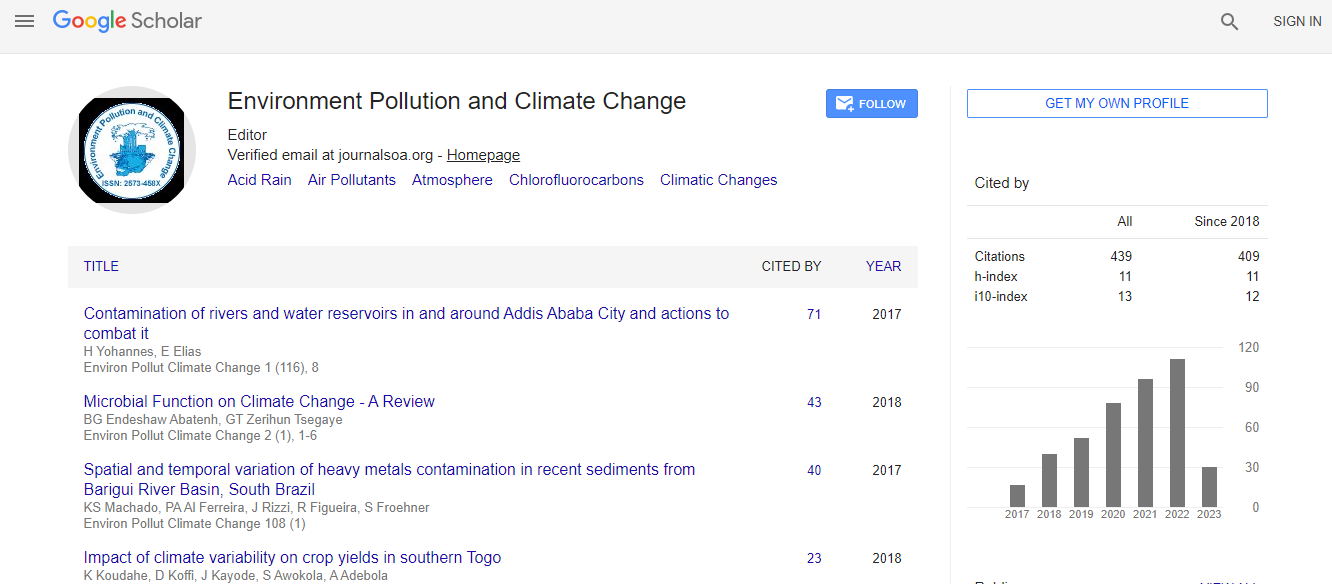Our Group organises 3000+ Global Conferenceseries Events every year across USA, Europe & Asia with support from 1000 more scientific Societies and Publishes 700+ Open Access Journals which contains over 50000 eminent personalities, reputed scientists as editorial board members.
Open Access Journals gaining more Readers and Citations
700 Journals and 15,000,000 Readers Each Journal is getting 25,000+ Readers
Google Scholar citation report
Citations : 672
Environment Pollution and Climate Change received 672 citations as per Google Scholar report
Environment Pollution and Climate Change peer review process verified at publons
Indexed In
- Google Scholar
- Publons
- Euro Pub
- ICMJE
Useful Links
Recommended Journals
Share This Page
Assessing COVID-19 impacts on Agricultural Food Production among Smallholder Farmers in Northern Drakensberg Areas of KwaZulu Natal, South Africa
Global Summit on Environmental Health
Bonginkosi E. Mthembu
Mangosuthu University of Technology, South Africa
ScientificTracks Abstracts: Environ Pollut Climate Change
Abstract
In South Africa, 11.8 million people experience hunger with 20% of the population facing high levels of acute food insecurity. COVID-19 pandemic with associated mitigation measures, including climate change, high food prices, exacerbated the already deteriorated food insecurity in South Africa. COVID-19 pandemic disrupted agricultural food production and food supply chain in various parts of the world. However, the degree of COVID-19 pandemic disruptions on agricultural food production is very scanty in rural farming systems in South Africa. Smallholder farmers play a major role in agricultural food production and therefore are key to sustainable household food security. The purpose of the study was to assess the extent of COVID-19 pandemic and its impact on food production among smallholder farmers in northern Drakensberg areas of Bergville. Survey study, which was smallholder farmer centred, was conducted through the use of in-depth individual farmer interviews to investigate the impacts of COVID-19 pandemic on food production. The survey focused on farmer participation in production of staple crops of maize, dry beans and soybeans pre-COVID-19 and during COVID-19. Majority of farmers (92.4%) reported experiencing difficulties in accessing key resources such as agricultural inputs and other essential services during COVID-19. The study indicated decline in number of farmers producing staple crops during COVID-19 pandemic and this was accompanied by decrease in crop yields. Food production practices and processes were severely disrupted by COVID-19 lockdowns associated with movement restriction measures that were undertaken to curb the spread of COVID-19 pandemic in the local area. It is essential that COVID-19 policies and legislation sensitive to the plight of smallholder farmers are advocated because these farmers commonly depend on local agricultural food production for their income and livelihoods.Biography
Dr. Bonginkosi E. Mthembu is Head of Community Extension, Faculty of Natural Sciences at Mangosuthu University of Technology, Durban, South Africa. He teaches Field Crop Production, Soil Science, Land Use Planning and Extension. His skills and expertise are in cropping systems, sustainable agriculture, crop production, soil fertility, agroecology. He is an Alumni of the: Cwaka College of Agriculture, Empangeni, South Africa (Diploma in Agriculture); University Of Fort Hare, Alice (B Agric; B Agric. Hons); North Carolina A&T State University, NC, USA (MSc. Plant & Soil, MSc Agric. Educ.); University Of KwaZulu Natal, Pietermaritzburg, South Africa (Ph.D.). He is conducting research on COVID-19 impacts and implications to agri-food sector. Other research include Mixed Cropping and Agroforestry systems in collaboration with the University of KwaZulu Natal, Council for Scientific and Industrial Research (CSIR) and Water Research Commission. The purpose is to achieve sustainable food production systems with the protection of the environment.

 Spanish
Spanish  Chinese
Chinese  Russian
Russian  German
German  French
French  Japanese
Japanese  Portuguese
Portuguese  Hindi
Hindi 
